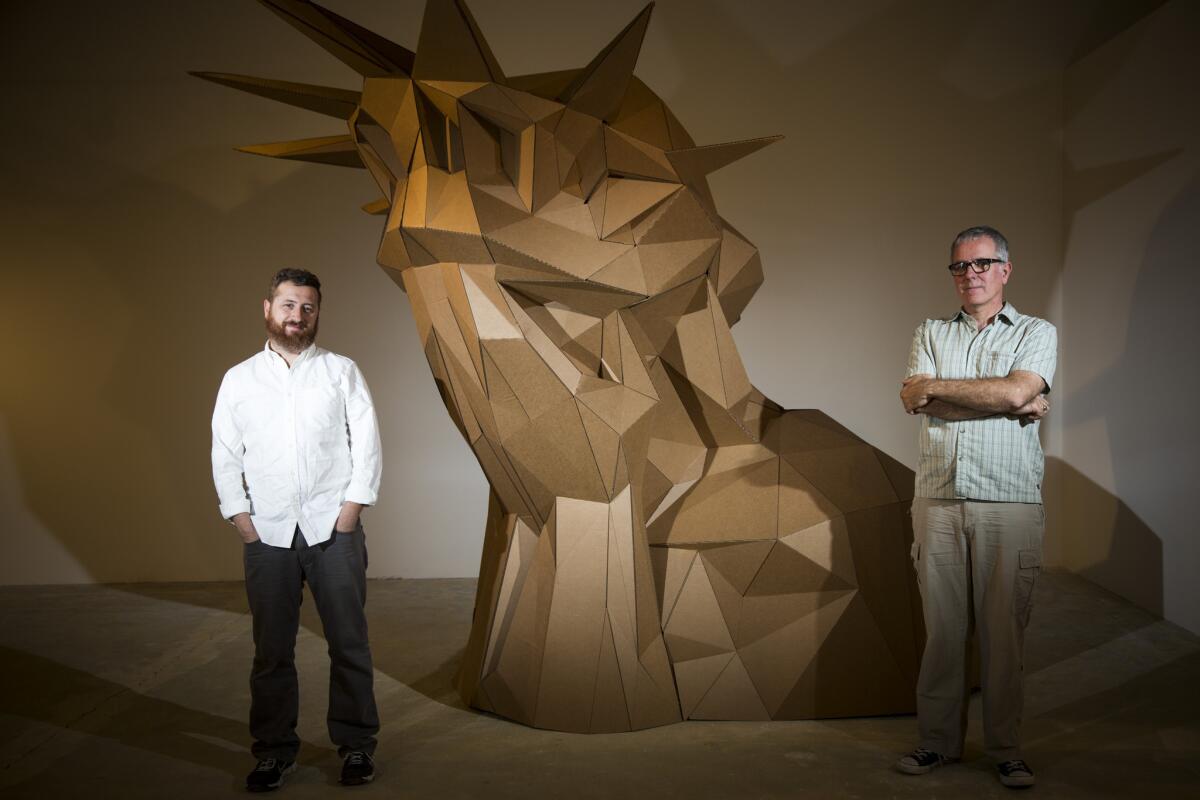150 artists and a Ferguson, Mo., police car at political pop-up ‘Manifest Justice’

- Share via
It couldn’t be a more poignant moment in which to have an exhibition on the topic of social justice. Baltimore is reeling from riots in the wake of Freddie Gray’s death, the young man whose spine was severed while in the custody of police officers. And around the United States on Wednesday, people took to the streets to protest police violence. This comes after a long season of protests following the deaths of other black males at the hands of police: Walter Scott in South Carolina, Tamir Rice in Ohio, Eric Garner in New York and Michael Brown in Ferguson, Mo.
“Manifest Justice,” which opens on Saturday as both an art exhibit and a pop-up space in the old Baldwin Theater in Baldwin Hills (part of a defunct local chain of African American-owned cinemas), will explore questions of power and inequity -- along with a slew of other hot topics, such as racism, environmental degradation and the prison industrial complex.
The show includes vintage political placards, civil rights photography and dozens of works by contemporary artists -- such as a gutted police car from Ferguson, which, on Wednesday afternoon, was being transformed into a garden of sorts at the “Manifest Justice” space by Des Moines artist Jordan J. Weber.
“We really come from a place where artists are a vital ingredient to social change,” says Yosi Sergant, one of the exhibition’s organizers. “They can speak truth to power in so many ways -- ways that many of us can’t find words for.”
More than 30 events are planned for the 10-day pop-up show that will feature more than 220 works by an estimated 150 artists from all over the United States and beyond. This includes submissions from conceptual artists, painters, poster artists, sculptors, graphic designers and performers.
On the lower level of the two-story auditorium space hangs a watercolor by the figurative painter Eric Fischl, as well as a wall hanging by Hank Willis Thomas, a collage crafted out of prison stripes. Upstairs, a cardboard Statue of Liberty by Joseph DeLappe holds her face in her hands in distress, Weber’s repurposed police car/planter plainly in view.
Among the various events to take place in the old auditorium are job clinics, legal counseling, spoken-word performances and a talk about resilience by Sybrina Fulton, who is the mother of Trayvon Martin, the young man killed by George Zimmerman in Florida, and Dr. Robert Ross, head of the California Endowment, a nonprofit group focused on issues of equitable health access.
On Saturday evening, Roger Guenveur Smith will reprise his one-man play “Rodney King,” which he has previously performed at Redcat in downtown Los Angeles. A couple of spaces in the building will address issues related to incarceration; another will serve as a workshop area for the activist group #BlackLivesMatter.
“This is really looking at the historic place of art and activism,” says Sergant. “We want to show how culture has shaped the conversation.”
The exhibition was put together by the team at Sergant’s cultural production agency, Taskforce, in collaboration with two nonprofit partners: Art for Amnesty and the California Endowment. Numerous other sponsors have pitched in with funding, music and materials.
Sergant has helped organize other “Manifest” events. “Manifest Equality,” in 2010, focused on gay rights in the wake of the passage of Proposition 8, which banned same-sex marriage in California (before the measure was overturned in federal court).
On Wednesday afternoon, Sergant was busy working out last-minute installation details -- straightening paintings, answering questions about wall text and marking wall space with blue tape. Near the entrance of the show hung an “I Am a Man!” poster from the Memphis Sanitation Strike of 1968, as well as Bill Eppridge’s iconic photograph of Cesar Chavez bearing tools. Just beyond these pieces hung a wall piece by Kyle Goen in honor of the 43 missing Mexican students from Ayotzinapa.
“I’ve been in front of this work daily, but sometimes I just find myself stopping,” Sergant says. “The artist is speaking, they’re saying something -- and it’s really powerful.”
Weber, in the meantime, shovels dirt into his dismantled police car, building a garden out of what, as of late, has been a symbol of oppression.
“Art isn’t always all about being commercially focused,” he says. “People need to come because this show is so relevant to what’s happening in America.”
“Manifest Justice” goes on view on Saturday at noon and runs through May 10. 3741 S. La Brea Ave., Baldwin Hills, Los Angeles, manifestjustice.org.
Twitter: @cmonstah
More to Read
The biggest entertainment stories
Get our big stories about Hollywood, film, television, music, arts, culture and more right in your inbox as soon as they publish.
You may occasionally receive promotional content from the Los Angeles Times.











